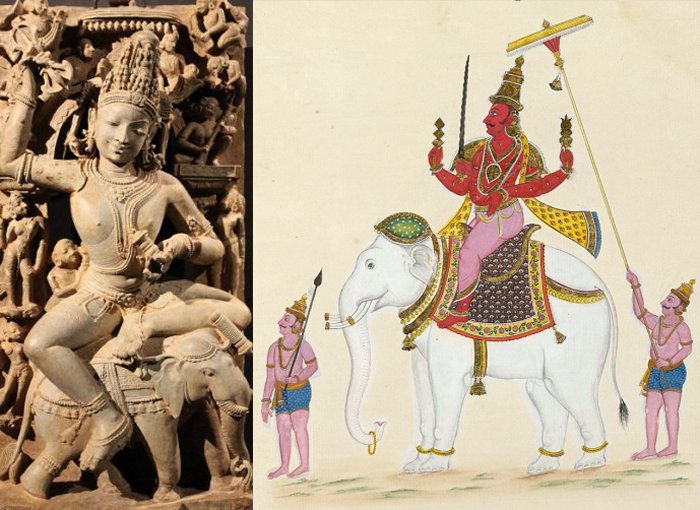Vedic God Indra: Ruler Of Heavens And Tough Warrior Who Kills Evil Serpent Vritra
A. Sutherland - AncientPages.com - Indra is the chief god of the heavens and of the East. He is the most popular god mentioned in the Vedic hymn collections, known as the Rigveda.
Numerous hymns are devoted to Indra, king of the gods, declared to be the "king that moves and moves not", the friend of mankind who holds the different tribes on earth. Many other hymns of the Rigveda praise Agni, the god of fire, and several other deities including the Ashvins.
Left: Indra, a guardian deity on the east side of a Hindu temple. Image credit: Nomu420 /Wikipedia - CC BY-SA 3.0; Right: Indra, the god of storms, riding on a white elephant, Airavata. Image credit: Public Domain
In the early Vedic literature, Indra is praised as a ruler of the Devas, supernatural beings.
Appearance Of Indra, Husband Of Shachi
He is often depicted riding on a large white elephant (Airavata). In Buddhist iconography, the elephant sometimes has three heads, while Jaina icons occasionally show the elephant with five heads. Airavatha is believed to have emerged during a process of churning the ocean of milk. This elephant guards one of the points of the compass.
Another Indra’s great treasure is his wonderful, seven-headed flying horse Uchchaihshravas, created during the churning of the milk ocean. It is considered the best of horses, archetype, and king of horses.
Uchchaihshravas seven-headed horse in Hindu mythology. Left: A seven-headed winged Uchchaihshravas with other treasures from Samudra manthan. Credit: Public Domain - Right: Public Domain
Indra has powerful weapons, which make him look invincible. He is frequently depicted holding and using vajra, a terrifying, light-throwing thunderbolt, which was capable to destroy vehicles of attacking enemies. When depicted with four arms, he holds two spears.
His wife is Shachi (also known as Indrani, Aindri, Poulomi, and Mahendri), the divine queen of the gods and the goddess of wrath and jealousy. Shachi is a beautiful and intelligent owner of one thousand eyes. As her husband, Indra, she has a white elephant and is associated with lions.
Epithets And Multiple Functions Of Powerful God Indra
In the mythologies of many ancient cultures, we encounter gods and goddesses having multiple epithets and serving many functions. They performed multiple roles and had many epithets that emphasized different aspects of their authority. As we have discussed before on Ancient Pages, Odin for example was not only a god of war but also of wisdom and magic. The Egyptian god, Horus was a god of kingship and represented a form of the rising sun and its earliest light. The Greek god Zeus was associated with wars and responsible for order, law and justice.
Indra (alias Sakra) and Shachi riding the five-headed Divine Elephant Airaavatha, Folio from a Jain text, Panch Kalyanaka (Five Auspicious Events in the Life of Jina Rishabhanatha), circa 1670-1680, Painting in LACMA museum, originally from Amber, Rajasthan. Credit: Unknown, India, Rajasthan, Amber, South Asia, Public domain, via Wikimedia Commons
In the Rig-Veda, Indra is referred to as Sakra ("the mighty-one) and to as Devendra ("Indra of the Devas") or Vrtrahan ("slayer of Vritra"), when he defeated Vritra described as the demon of drought. With the Vajra weapon, Indra has the power to raise devastating storms with thunder, cause heavy rains, the river flows, and beneficial rainfall needed for agriculture.
Like the latter, the deity represents a symbol of fertility.
 A statue of Bhagvan Indra on the walls of Mirpur Jain Temple. Image credit: Nihir Shah23 --- CC BY-SA 3.0
A statue of Bhagvan Indra on the walls of Mirpur Jain Temple. Image credit: Nihir Shah23 --- CC BY-SA 3.0
Chief of the gods, Indra leads them against the Asuras, according to the Vedic hymns. He participates in an elaborate process known as the Churning of the Ocean and frequently engages in conflicts with many other hostile forces. However, the main myth about Indra tells about his battle with the serpent Vritra.
The mighty Indra is the king of Svarga (or Svargaloka – “heaven”) one of the seven heavenly realms in Hindu cosmology, located on and above Mt. Meru. The place is a paradise, where the warriors dwell waiting for their next incarnation.
Indra’s dwelling place reminds of Odin’s Valhalla, the gigantic and majestic chamber of the fallen Viking heroes – warriors and mighty chiefs - who died heroic deaths in battle.
Slaying Of Vritra That Blocked The Water Flow
Indra rides his remarkable elephant Airaavatha when he defeats Vritra, the demon of drought using his powerful thunderbolt - vajra. The dangerous Vritra must be eliminated because it is the great symbolic evil (malevolent type of Asura) that hampers human prosperity and happiness.
According to myths, the Vritra is an ice demon of colder central Asia and northern latitudes, who holds back the water. Indra is the one who releases the water from the winter monster.
Indra Has Many Counterparts In Cultures Around The World
Among the Hindus, the god Indra was named Parjanya, a word with the same root as “Pyerun” in Russian who is , “Piorun” in Polish, “Perun” in Czech, “Peron” in Slovak. Perun, God of Heaven and Lightning is mentioned in numerous myths and legends of the Slavs especially inhabitants of the Czech Republic, Poland and Russia. It is believed he can be compared to the Norse god Thor, who mastered storms and lightning, Zeus, Odin, and Anu, a ruler of the heavenly abode in the Sumerian pantheon of gods.
As in many other cases in Indian mythology, with the passage of time, Indra's position underwent changes. He became the only demigod in Hindu tradition and lost much of his importance and greatness.
Updated on June 21, 2021
Written by – A. Sutherland - AncientPages.com Senior Staff Writer
Copyright © AncientPages.com All rights reserved. This material may not be published, broadcast, rewritten or redistributed in whole or part without the express written permission of AncientPages.com
Expand for referencesReferences:
Frawley, D. Gods, Sages and Kings
Sarma, Krishna. Source Book of Hindu Mythology
More From Ancient Pages
-
 Spectacular Giant Bronze Age Hall Found Near Berlin, Germany May Be Connected To Legendary King Hinz
Archaeology | Nov 6, 2023
Spectacular Giant Bronze Age Hall Found Near Berlin, Germany May Be Connected To Legendary King Hinz
Archaeology | Nov 6, 2023 -
 Mysterious Etruscan Stone Structures Hidden In The Malano Forest – Evidence Of Ancient Unknown High-Tech Knowledge?
Featured Stories | Dec 19, 2020
Mysterious Etruscan Stone Structures Hidden In The Malano Forest – Evidence Of Ancient Unknown High-Tech Knowledge?
Featured Stories | Dec 19, 2020 -
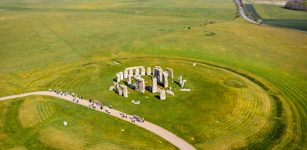 Controversial Tunnel Plan Near Stonehenge Gets U.K. Government Approval – Shocked And Angry Opponents Will Challenge The Decision In High Court
News | Nov 13, 2020
Controversial Tunnel Plan Near Stonehenge Gets U.K. Government Approval – Shocked And Angry Opponents Will Challenge The Decision In High Court
News | Nov 13, 2020 -
 Intriguing Genetics: First Ancient Irish Human Genomes – Sequenced
Archaeology | Dec 29, 2015
Intriguing Genetics: First Ancient Irish Human Genomes – Sequenced
Archaeology | Dec 29, 2015 -
 Mystery Of The Horrible ‘Thing’ Found In A Dominican Monastery
Featured Stories | Sep 4, 2023
Mystery Of The Horrible ‘Thing’ Found In A Dominican Monastery
Featured Stories | Sep 4, 2023 -
 5 Myths About The Amazons – Ancient Female Warriors
Featured Stories | Jan 13, 2016
5 Myths About The Amazons – Ancient Female Warriors
Featured Stories | Jan 13, 2016 -
 Mysterious Gympie Pyramid: Evidence Of An Ancient Lost Civilization In Australia?
Civilizations | Feb 13, 2020
Mysterious Gympie Pyramid: Evidence Of An Ancient Lost Civilization In Australia?
Civilizations | Feb 13, 2020 -
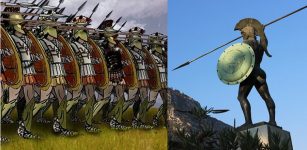 Sparta And Legendary King Leonidas: The Heroes Of Thermopylae
Featured Stories | Jul 18, 2018
Sparta And Legendary King Leonidas: The Heroes Of Thermopylae
Featured Stories | Jul 18, 2018 -
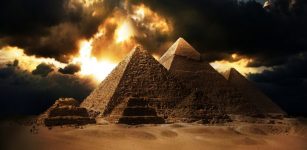 Fall Equinox Explains Unusual Alignment Of Egypt’s Great Pyramids – Engineer Says
Archaeology | Feb 26, 2018
Fall Equinox Explains Unusual Alignment Of Egypt’s Great Pyramids – Engineer Says
Archaeology | Feb 26, 2018 -
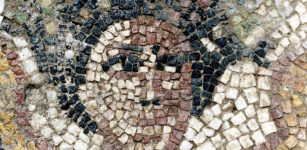 Floors In Ancient Greek Luxury Villa Were Laid With Recycled Glass
Archaeology | Jul 25, 2022
Floors In Ancient Greek Luxury Villa Were Laid With Recycled Glass
Archaeology | Jul 25, 2022 -
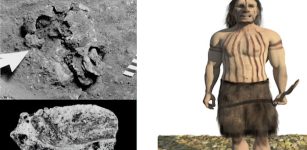 Re-Discovered Ancient Ksâr ‘Akil Fossils Shed New Light On Human Evolution
Archaeology | Mar 28, 2023
Re-Discovered Ancient Ksâr ‘Akil Fossils Shed New Light On Human Evolution
Archaeology | Mar 28, 2023 -
 Indigenous Communities Used The Caribbean Sea As An Aquatic Highway
Archaeology | Jun 23, 2022
Indigenous Communities Used The Caribbean Sea As An Aquatic Highway
Archaeology | Jun 23, 2022 -
 Historic Graffiti Made By Soldiers Sheds Light On Africa’s Maritime Heritage – New Study
Archaeology | May 6, 2022
Historic Graffiti Made By Soldiers Sheds Light On Africa’s Maritime Heritage – New Study
Archaeology | May 6, 2022 -
 ‘Something’ Ancient And Strange Was Found Hidden Inside A Huge Underground Structure – What Happened Next Is A Mystery
Featured Stories | Nov 8, 2023
‘Something’ Ancient And Strange Was Found Hidden Inside A Huge Underground Structure – What Happened Next Is A Mystery
Featured Stories | Nov 8, 2023 -
 Unexpected Underwater Discovery Of 50,000 Ancient Coins Off Sardinia Hints At Hidden Shipwreck
Archaeology | Nov 10, 2023
Unexpected Underwater Discovery Of 50,000 Ancient Coins Off Sardinia Hints At Hidden Shipwreck
Archaeology | Nov 10, 2023 -
 Fossilized Million-Year-Old Human Skull Of Yunxian Man Excavated In China
Archaeology | Jan 10, 2023
Fossilized Million-Year-Old Human Skull Of Yunxian Man Excavated In China
Archaeology | Jan 10, 2023 -
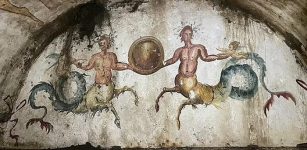 Remarkably Well-Preserved 2,000-Year-Old ‘Tomb Of Cerberus’ With Amazing Frescoes Discovered In Italy
Archaeology | Oct 12, 2023
Remarkably Well-Preserved 2,000-Year-Old ‘Tomb Of Cerberus’ With Amazing Frescoes Discovered In Italy
Archaeology | Oct 12, 2023 -
 Ancient DNA Reveals Migration From North America Across The Bering Sea And Unknown Prehistoric People In Siberia
Archaeology | Jan 12, 2023
Ancient DNA Reveals Migration From North America Across The Bering Sea And Unknown Prehistoric People In Siberia
Archaeology | Jan 12, 2023 -
 Uruk Prophecy Found In The Ancient Library Of A Magician With Divine Powers
Artifacts | Jul 8, 2019
Uruk Prophecy Found In The Ancient Library Of A Magician With Divine Powers
Artifacts | Jul 8, 2019 -
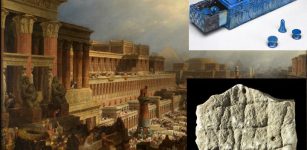 4,500-Year-Old Board Games And Game Pieces Unearthed At Gath
Archaeology | Jun 19, 2022
4,500-Year-Old Board Games And Game Pieces Unearthed At Gath
Archaeology | Jun 19, 2022

